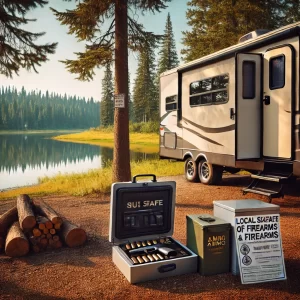“`html
Understanding Frigid Weather’s Impact on RVs with Mark Polk
As winter approaches, RV owners face unique challenges when it comes to protecting their mobile homes from harsh weather conditions. **Mark Polk**, a renowned expert from RV Education 101, shares valuable insights into how frigid temperatures can impact RVs and what steps you can take to safeguard your investment.
The Unique Vulnerabilities of RVs in Cold Weather
RVs, much like traditional homes, need proper maintenance to withstand extreme cold. However, their unique structure often makes them more susceptible to certain winter woes. Here’s why cold weather can be particularly tough on RVs:
- Thin Walls and Insulation: The reduced insulation in many RVs compared to homes can lead to rapid heat loss.
- Plumbing Risks: Exposed pipes and tanks are prone to freezing and bursting.
- Battery Degradation: Cold temperatures can drastically reduce battery performance and longevity.
Understanding these vulnerabilities is the first step to ensuring your RV remains in excellent condition throughout the winter months.
Winterizing Your RV: Essential Steps
Winterizing your RV is critical to protecting it from damage caused by freezing temperatures. Mark Polk outlines some indispensable tips for thorough winterization:
1. Ensure Proper Insulation
Enhancing your RV’s insulation can make a significant difference in maintaining a comfortable indoor temperature:
- Seal Windows and Doors: Use weather stripping or caulk to seal any gaps.
- Insulate the Underbelly: Consider adding extra insulation to the RV’s underbelly to protect pipes and tanks.
2. Protect Your Plumbing System
The plumbing system is particularly vulnerable to cold weather:
- Drain Water Lines: Ensure all water is drained from lines and tanks to prevent freezing.
- Add Antifreeze: Pour RV-specific antifreeze into drains and the toilet to prevent any remaining water from freezing.
3. Maintain Your Battery
Cold can sap your battery’s power faster than you might expect:
- Check Battery Health: Ensure the battery is fully charged and in good condition.
- Store Indoors: If possible, remove and store the battery in a warmer environment when not in use.
4. Temperature Control Inside the RV
Keeping your RV warm ensures not only comfort but also added protection for other systems:
- Use Space Heaters: Portable heaters can help maintain a constant temperature inside.
- Cover Vents: Use vent cushions to minimize heat loss through roof vents.
Long-Term Storage Considerations
If you plan on storing your RV during the winter months, taking the right steps can prevent unnecessary damage:
- Choose a Sheltered Location: If possible, store your RV under a cover or in a garage to shield it from the elements.
- Regular Inspections: Snow can accumulate quickly, so regular checks for any potential damage or leaks are essential.
Mark Polk’s Expert Advice on Frigid Weather
As an expert with years of experience, Mark Polk emphasizes the importance of early preparation. Each fall, view the task of winterizing not just as a maintenance chore, but as an essential step in prolonging the life of your RV. **”Thinking ahead can save you time and a lot of money in repairs come spring,”** he notes.
Additional Tips from Mark Polk:
- Keep a Journal: Keep track of winterization routine for future reference.
- Stay Informed: Watch educational videos or attend RV maintenance workshops for more detailed guidance.
Conclusion: Be Proactive to Protect Your RV
Taking a proactive approach to winterizing your RV can ensure it remains in top condition, ready for your next adventure once warmer weather returns. By following Mark Polk’s advice and implementing the necessary measures, you can enjoy peace of mind knowing your RV is well-protected against the challenges of frigid weather.
Remember, with the right preparation, even the harshest winters can be weathered without undue worry or stress. Stay warm and safe in your travels, no matter the season!
“`

